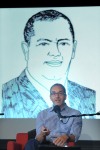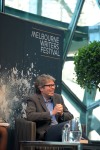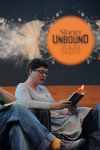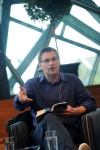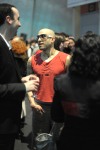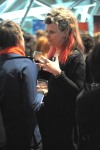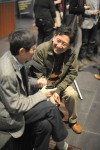Blog Archives
Birds don’t have to be for anything: Jonathan Franzen and Sean Dooley on birds
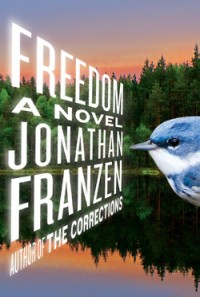 Jonathan Franzen is a renowned bird-watcher and conservationist, as is Sean Dooley (The Big Twitch). They spoke this afternoon to ABC Radio’s Michael Veitch (himself a keen bird-watcher) about their mutual passion. Is there something about the elusiveness of birds that attracts writers?
Jonathan Franzen is a renowned bird-watcher and conservationist, as is Sean Dooley (The Big Twitch). They spoke this afternoon to ABC Radio’s Michael Veitch (himself a keen bird-watcher) about their mutual passion. Is there something about the elusiveness of birds that attracts writers?
To kick off, Veitch polled audience members, who mostly proved at least either bird-watchers or Franzen/Dooley readers, if not a combination of both. For fairness’ sake, Veitch also asked ‘How many of you are bird watchers who have never heard of Jonathan Franzen or Sean Dooley?’ Two lone but brazen birders put their hands up and received an air-kiss from Franzen in response.
Audience bona fides having been ascertained, it was time to test the panellists, who went to the Werribee sewage farm yesterday (which Franzen called ‘one of the most beautiful places I’ve ever been’). Veitch reeled off a list of Victorian birds, and it turned out the intrepid travellers hadn’t seen very many (one particular species had been sighted ‘very distantly, through heat shimmers’, but Franzen joked ‘Yes, we missed almost everything’) even though the site is renowned for its birdlife: ‘25 kilometres of open poo ponds’ that Dooley said birds love. Apparently 370 species of birds have been sighted there in the past fifty years or so.
Writing is an isolating pastime, but, Veitch asked, is birding something you can enjoy doing with others? ‘More eyes means you see more stuff’, Franzen agreed, but it can also be done alone; ‘I prefer to be myself. It’s a great, great activity … who wants to go to a party when you can slip out and see a bird or two?’ Indeed, those hoping to see Franzen at MWF parties may be disappointed, as Dooley then happened to mention there was somewhere near Federation Square where they could slip out to see some avian life instead.
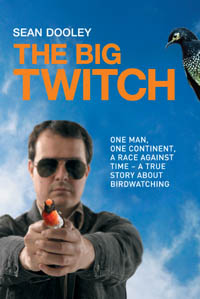 Dooley agreed: ‘I basically go bird-watching for the birds, not for the bird-watchers.’ Not surprising from someone who blew his inheritance on buying a four-wheel drive and bird-watching for a year, an experience he wrote about in The Big Twitch: ‘It was a good chance to get out into nature.’
Dooley agreed: ‘I basically go bird-watching for the birds, not for the bird-watchers.’ Not surprising from someone who blew his inheritance on buying a four-wheel drive and bird-watching for a year, an experience he wrote about in The Big Twitch: ‘It was a good chance to get out into nature.’
Not only is it a chance to reconnect with nature, but bird-watching is also a pursuit that has changed the way Franzen responds to nature. Instead of approaching it as something that’s for him, for his contemplation – ‘Am I alone enough?’ – it’s now the habitat of the creatures he loves.
Do the writers write differently thanks to their interest in birds? Franzen: ‘More carefully … As a reader I turn off if I’m about to be subjected to too much appreciation of nature.’
Then to the cerulean warbler, the bird made arguably a thousand times more famous by its inclusion in Franzen’s latest novel, Freedom. Why did he decide to feature this bird, a ‘bluish, small and unintelligent looking’ one? ‘It’s arguably the fastest declining songbird in North America,’ Franzen explained, ‘and happens to have a stronghold in West Virginia’, where the novel is set. That location is ‘a dystopian vision of what America is becoming’, with the environmental destruction, out-of-town interested making money, and residents maintaining a relatively low quality of life. ‘It’s a pan-American bird,’ which winters in South America, and ‘it’s pretty’.
Veitch had purposely avoided asking his guests why birding was such an important pursuit for them, but by session’s end, Franzen had kind of answered it anyway: ‘I feel like it’s good to have something to do for my own sake – I have a Protestant work ethic that I can’t get away from except when I fall into a bird-watching trance.’ He’s become involved in bird conservation ‘as a way of justifying post hoc these days I spend for no other reason out in the bush other than it brings me pleasure’. Nevertheless, this doesn’t detract from the fact that birds are beloved and interesting qua birds: ‘Birds don’t have to be for anything.’
Short thoughts: on Jonathan Franzen
Last night’s Franzen-fest for me ended in a bottle of wine and tweet-ups, but only after listening to the man himself engage in a critical examination of the intersection between life and art. Focusing less on concepts than on craft, and expressing frustration at the question ‘Is your work autobiographical?’ and its implications, Franzen spoke candidly about how the process of writing The Corrections – indeed, the final book itself – was inextricably connected to his personal life. 
At pains to stress that this did not mean his work was littered with scenes taken directly from events in his own experience, he explained that the novel as it stands today could not have been written – would not work and could not be completed – until he had overcome the guilt, shame and misplaced loyalty that was eating away at him as a person. In this way, perhaps there was more of a lesson in Franzen’s talk for writers of fiction themselves than an audience of fans. Citing Kafka as an example, he claimed that the closer a writer gets to accurately portraying those deeper, murkier parts of themselves in their fiction, the less such fiction resembles the narrative of their own life.
I came away from Franzen’s keynote with the distinct impression that under that shuffling but endearing awkwardness, and books so fat they resemble house bricks, here is a writer who cares very deeply about literature as an art form and, I think, as a political tool. His uncompromising stance on the responsibility of fiction writers (and of literature in general) to push past simply churning out what comes easily is readily digestible in quip form but not so easily practised. Unless the writer feels personally at risk, he argued, unless they are attempting to surmount what feels like the insurmountable, unless they are digging deep into themselves and critically examining what they find, then their work is not worth reading, and the book itself was not worth writing.
Jonathan Franzen will be appearing at two more MWF events: discussing birdwatching with Sean Dooley and Michael Veitch on August 27 and In Conversation with Chloe Hooper on August 28.

